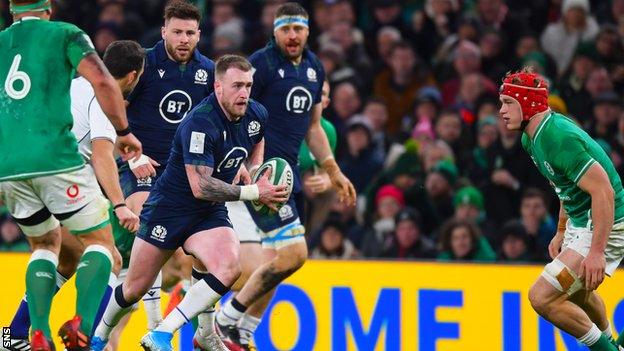Six Nations 2020: 'Scotland need fire & ice like boxing champion Taylor'
- Published
'I spoke to them about preparing for battle' - Taylor
Six Nations Championship: Scotland v England |
|---|
Venue: Murrayfield Stadium Date: Saturday, 8 February Kick-off: 16:45 GMT |
Coverage: Live on BBC TV, BBC Radio 5 Live and BBC Radio Scotland, live text commentary on BBC Sport website & app |
Thank goodness that the talking is about to stop and the action is about to begin.
The pre-match trash about "war" and "hate" was always somewhat lacking in believability and entertainment value coming from the mouths of a softly-spoken Scot with one Calcutta Cup to his name and a fine young Englishman who's never played in this fixture before. Joe Frazier versus Muhammad Ali, it was not.
The real stuff happens now. Gregor Townsend is trying to go three Tests unbeaten against England while still missing one of his key men, Finn Russell. Eddie Jones is trying to stave off mounting criticism of his stubbornness and his team selection while also missing a totem, Billy Vunipola, the man mountain the Scots would have feared the most.
Both sides lost last week, but there are degrees of defeat. Scotland left Dublin with credit for showing belligerence and progress. England left Paris on a wave of stick not just from the press, but from luminaries of their past - Martin Johnson, Clive Woodward, Lawrence Dallaglio and more.
They lined up to put the boot into Jones, to question his selections at 15 and nine and eight, to discuss the failing leadership of Owen Farrell, to ponder the lack of creativity and power, to pore over Jones' fighting talk pre-Paris and how it all boomeranged back and hit him square between the eyes. England got a kicking in the Stade last Sunday and have had more kickings every day since.
Scotland might not have Russell in their ranks but in Dublin they delivered on their mantra of bringing more aggression, better defence and staying in the fight until the last whistle. That's not something they've been doing all that often of late. Their old catchphrase used to be about playing the fastest rugby around. The new one is altogether more pragmatic - being a nightmare to play against.
Hard-hitting lessons in how to be clinical
That robust mentality they're searching for was in view in Dublin. No win, but we saw a ferocity that was a step up. It was interesting, also, to hear of a visitor to their camp on Friday.
With the IBF belt he won in beating Ivan Baranchyk and the WBA belt he won in defeating Regis Prograis and the Muhammad Ali trophy he earned when taking the World Boxing Super Series, Josh Taylor, the pride of Prestonpans, is a winner from top to toe.
Ahead of the Calcutta Cup, the world super-lightweight champion, famed in the ring for his imagination, his footwork, his engine and his ability to hit the target from mid-to-close range, was an appropriate guest speaker.
If Gregor Townsend's players are in need of a lesson in how to be clinical when opportunities present themselves - the moral of the story from Dublin last weekend - then before them they had a guy who could write the book. In becoming champ, Taylor's execution has been exemplary. In the business of spotting weakness and exploiting it, the fighter would have had a lot of knowledge to impart. The word is that he had a captive audience.
Scotland's intensity and directness was different in Dublin. The hard edge took Ireland by surprise, you felt. The gifts they doled out on the day came in threes - some stupidly conceded penalties that were kicked over the bar by Johnny Sexton - rather than in fives and sevens, with the kind of mishaps that have cost them dear for two years.
This kind of thing: the breakdown in communication between Tommy Seymour and Sean Maitland that cost them seven points against Ireland in 2019 and the incident that saw Allan Dell and Rob Harley tackling each other and allowing Joe Carbery in to create a try for Keith Earls in the same game. More soft points conceded.
Blair Kinghorn missing a must-make tackle on Josh Adams, Johnson selling himself for Jack Nowell, Russell kicking poorly and facilitating a score for Joe Launchbury. Scotland have been painfully easy to score against, their own worst enemy, but they were tighter in Dublin. They looked to have learned some lessons there, but what of their work down the other end?
Profligacy a recurring theme
Scotland are in need of a Taylor-esque efficiency in attack. In Dublin they had multiple visits to Ireland's 22, totalling nearly six minutes, and came away with just 0.38 points per raid. Ireland's return from visits to Scotland's 22 was 2.6 points. Ireland were poor, but they were more productive. The Stuart Hogg episode stands out, but they had so many other moments and failed to hammer them home.
For a team that had converted an extraordinarily high percentage of its chances in the 2017 championship, the problems with Scotland's conversion rate have become a bit of a recurring theme in the years since. Against Ireland last year they had an amount of ball in the Irish 22 but their points per visit was 1.86 compared to the away team's 2.75. Against Wales, yet another game they could and probably should have won, they had more ball and yet came away with 1.14 points per visit compared to Wales' more opportunistic 2.5.
It was only in the epic game against England where they showed that unforgiving streak. And how spectacular it was. Having scored a total of three tries in the 240 minutes against Ireland, France and Wales they then scored six in little over 40 minutes at Twickenham. No country had ever before scored six tries against England in their own ground in a Test match. The message of last season was that Scotland still have the capacity to shred defences to pieces, but that they don't do it nearly often enough to win matches in clusters.
That was one of the things that nailed them in Japan. Having played their way back into contention with 20 minutes to go, their execution let them down again. We remember clearly that Japan won and Scotland went out, but what's less memorable is that the Scots had a lot of ball in the final quarter of the match and ample opportunity to win by the required margin. They were undone by their own errors, their own profligacy, their own maddening habit of shooting themselves in the foot.

Scotland failed to make the most of their attacking opportunities in Dublin
Can they quell fired-up England?
What of Saturday? Can they bring that same aggression they had in Dublin? Can the controlled anger up front be backed up? Can they take their chances this time? Can they quell what is surely going to be a fired-up England, hell-bent on making up for their experience in Paris?
That's down to fast-improving Adam Hastings and the way he runs the game but it's down to the pack in the first instance. Let's not engage in war analogies, but we saw in Dublin a new side to the Scottish forwards, hugely encouraging things from the prodigal prop, Rory Sutherland, and a new maturity in Zander Fagerson, a tighthead who could become one of the best in the world if he kicks on.
Scott Cummings was terrific alongside Jonny Gray. Hamish Watson and Jamie Ritchie were carriers, scrappers, whirling dervishes. They're joined by Magnus Bradbury on Saturday. Bradbury is two players in one; anonymous on his worst days, ubiquitous on his best. England hadn't the first clue what to do with him when Scotland came roaring back to life at Twickenham last year. He was outrageously good. Unstoppable.
On Friday, Taylor, the been-there-done-that kid, told the Scottish players how he brings fire and ice to the ring, how he marries offensive thunder with cold-blooded strategy. That's the clinical mindset of a great champion. Townsend will need 23 men like at Murrayfield.
